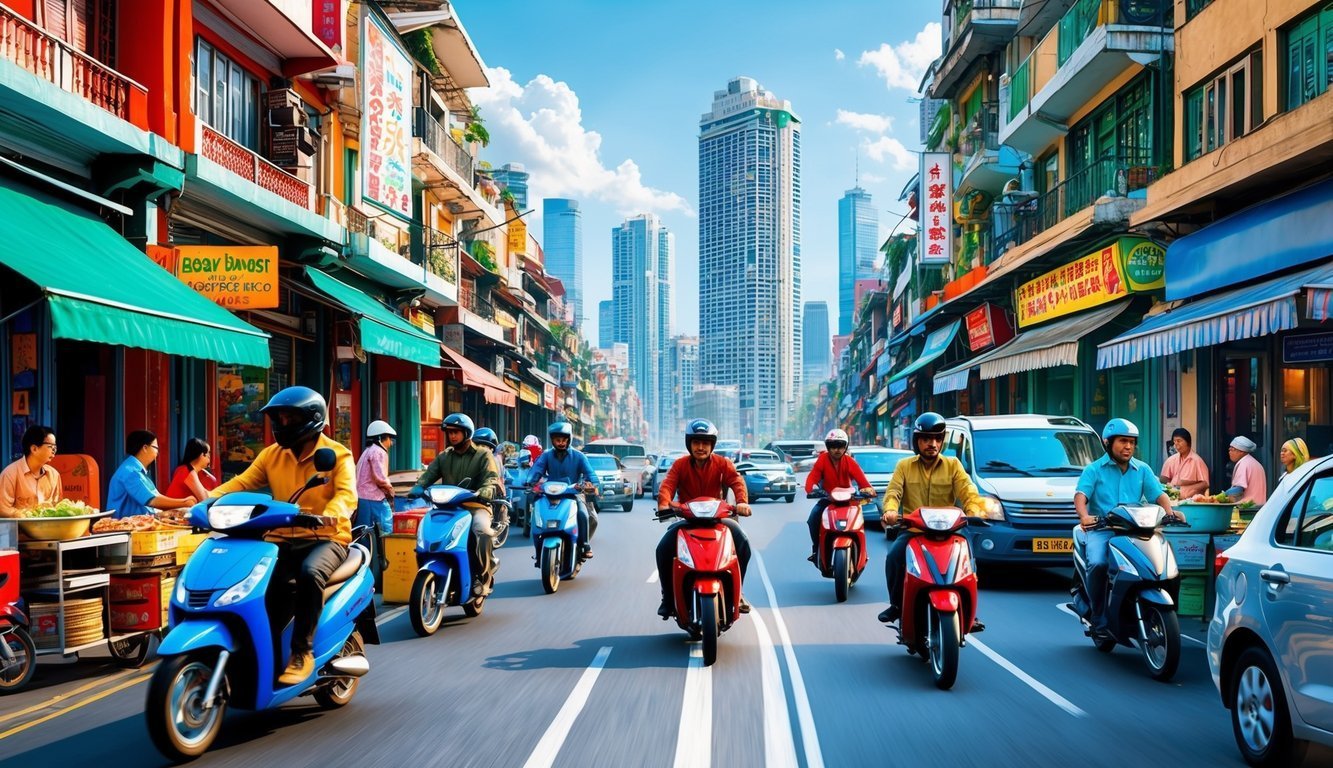Ho Chi Minh City, often called Saigon, is a vibrant hub that offers a unique experience for digital nomads. It’s an ideal spot for those looking to work remotely while experiencing a rich culture.
This is thanks to affordable living costs, plenty of coworking spaces, and a lively street life. The city combines traditional Vietnamese charm with modern amenities, making it easy for you to settle in and be productive.
As you wander through the bustling streets, you’ll find great food, friendly locals, and numerous parks to unwind in after a day of work. Getting around is simple, with options like motorbike rentals and public transport.
The lively atmosphere and countless social opportunities mean you can easily connect with fellow nomads and locals alike.
Living in Ho Chi Minh City gives you a taste of both work and play.
The cultural experiences, along with a low cost of living compared to many Western cities, make it a compelling choice for digital nomads from all walks of life.
Key Takeaways
- Ho Chi Minh City offers affordable living and reliable coworking spaces.
- The city has a rich culture and vibrant lifestyle perfect for exploration.
- Transportation is easy, enhancing your mobility around the city.
Exploring Ho Chi Minh City
Ho Chi Minh City is a vibrant place full of life, culture, and flavors.
From bustling markets to rich history, there’s plenty for you to discover.
Let’s dive into the local experiences that define Saigon.
Local Markets and Street Food Scene
One of the best ways to experience Ho Chi Minh City is through its local markets and street food. Ben Thanh Market is a must-visit.
Here, you can find everything from fresh produce to handmade souvenirs.
It’s an excellent spot for haggling.
Don’t forget to try delicious Pho and Banh Mi from street vendors.
These dishes are part of daily life in Vietnam. Wander through the streets and you’ll smell the mouthwatering aromas of grilled meats and fresh herbs.
The bustling atmosphere makes eating here a full experience.
Historical Landmarks and Culture
Exploring Ho Chi Minh City wouldn’t be complete without visiting its historical landmarks.
The War Remnants Museum offers deep insights into Vietnam’s past.
It’s a bit intense, but it provides a real look at history.
Another great spot is the Notre Dame Cathedral.
This stunning building has beautiful architecture, perfect for photos or a quiet moment. You can also visit the Cu Chi Tunnels nearby, which tell stories of resilience and survival during tough times.
These sites provide a balance of learning and cultural immersion.
Nightlife and Social Spots
When the sun sets, Saigon comes alive with exciting nightlife.
District 1 is where you’ll find many bars and clubs.
Venues like Bui Vien Street have a lively atmosphere that attracts both locals and travelers.
If you want something more relaxed, check out the rooftop bars.
They offer fantastic city views with a chill vibe. Enjoying a drink while watching the sunset is a great way to end your day.
Joining in local customs like enjoying a night market or music scene can also enhance your experience.
Accommodation and Living
Finding the right place to stay in Ho Chi Minh City can really enhance your experience as a digital nomad.
The options vary widely, so it’s good to know what neighborhoods to consider and what type of housing might fit your lifestyle and budget.
Finding the Right Neighborhood
Choosing a neighborhood can make a big difference in your daily life.
District 1 is the bustling heart of the city with quick access to shops and cafes, making it a popular spot.
If you prefer a quieter vibe, check out District 2, especially Thao Dien, which has a laid-back expat community.
Other great options include Binh Thanh for a mix of local and expat culture or Phu Nhuan for something more residential. District 7 and Phu My Hung offer modern living with parks and amenities if you like a more relaxed atmosphere.
Housing Options for Digital Nomads
When it comes to housing, you have several choices.
For budget-friendly options, hostels and co-living spaces are smart picks if you want to meet fellow nomads.
You can also find comfortable Airbnbs that offer more privacy along with kitchen facilities.
Renting a room in a shared apartment or finding a studio can range from $200 to $600 per month, depending on the neighborhood and amenities.
Fancy something upscale? Look into apartments in District 3, where you can enjoy a mix of local charm and modern facilities.
Balancing cost and comfort is key, so think about what fits your needs best.
Working in Saigon
Saigon offers a vibrant environment for digital nomads and remote workers.
With plenty of co-working spaces and a bustling community, you’ll find that working here can be both productive and enjoyable.
Co-Working Spaces and Internet
When it comes to co-working spaces, Saigon shines.
You have options like Dreamplex, known for its modern design and vibrant atmosphere.
With high-speed internet and great facilities, it’s perfect for those looking to focus.
The Hive is another top choice, offering a collaborative vibe and networking events.
If you prefer a more casual setting, Circo and Toong provide cozy spaces to work while enjoying a coffee.
Internet infrastructure in Saigon is strong, with average internet speeds reaching around 25-30 Mbps.
This makes it easy for you to work remotely without interruptions.
Most co-working spots ensure you have access to reliable connections and power outlets.
Networking and Community for Remote Workers
Connecting with fellow digital nomads is simple in Saigon.
The city hosts numerous meetups and networking events tailored for remote workers. Facebook groups dedicated to digital nomads and expats are great for finding local events or even just grabbing coffee with someone new.
Many co-working spaces also organize workshops and social gatherings, making it easy for you to make connections.
This collaborative environment fosters creativity and can lead to new opportunities.
Engage with communities on platforms like Meetup or Eventbrite to find events that suit your interests.
Transportation and Mobility
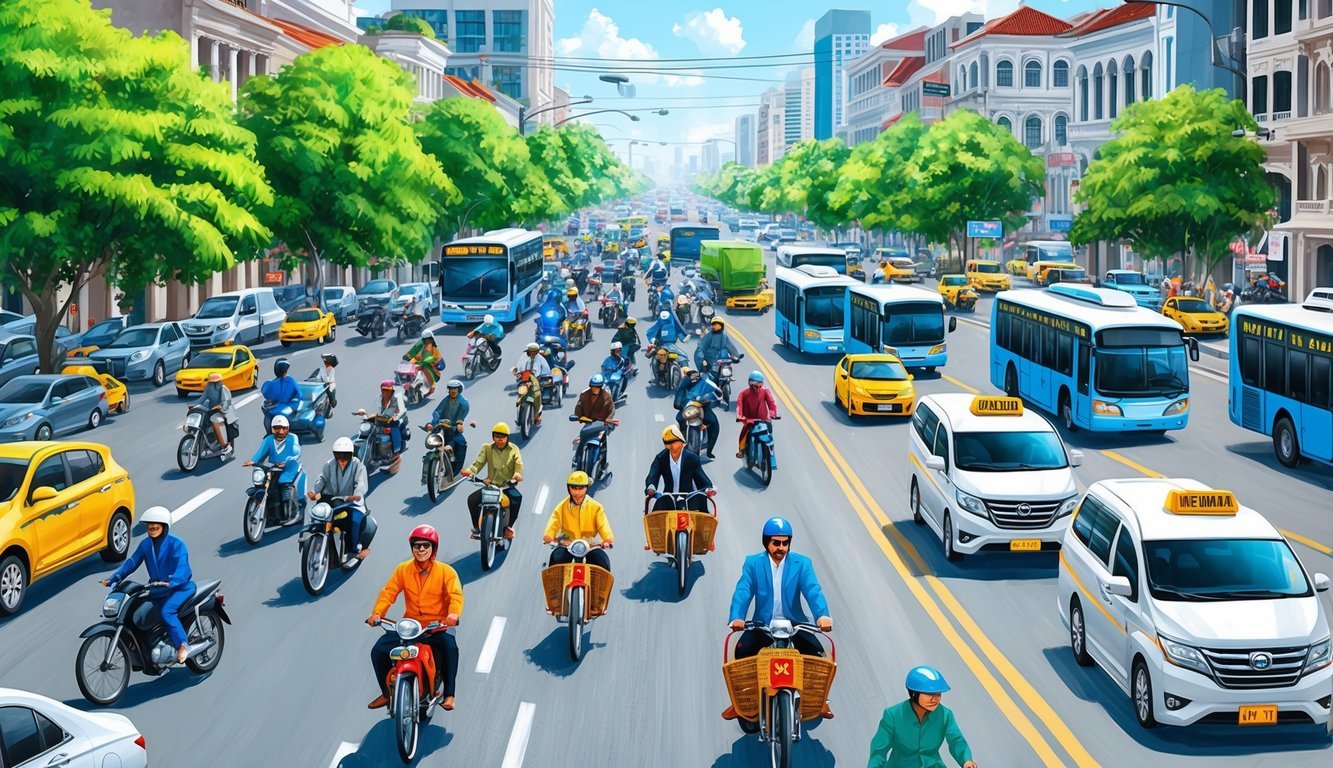
Getting around Ho Chi Minh City is quite straightforward, with a mix of public transportation and ride-sharing options.
Understanding these can help you navigate the bustling streets more easily.
Public Transportation Options
In Ho Chi Minh City, the public transportation system mainly includes buses.
These buses cover many routes and are a budget-friendly way to explore the city.
You can find buses that travel to various districts and tourist spots.
Keep in mind that buses can get crowded during peak hours.
Make sure you check the schedules and routes ahead of time.
Also worth noting is the new metro line that is under construction, which, once completed, will improve transit options significantly.
Ride-Sharing and Moving Around
Ride-sharing services, like Grab, are popular and convenient in the city.
With just a few taps on your phone, you can request a ride.
This is a great option for quick trips or if you want to avoid the hassle of navigating traffic.
Motorbike taxis, known as “xe ôm,” are another speedy way to get around.
They weave through traffic and are usually faster than cars.
If you’re feeling adventurous, consider renting a motorbike yourself, but be cautious with the heavy traffic and local driving rules.
Lastly, Tan Son Nhat International Airport connects you to various parts of the city.
The airport is accessible by taxis, ride-sharing services, and airport buses, making your travel in and out of the city seamless.
Leisure and Lifestyle
In Ho Chi Minh City, you’ll find a vibrant mix of places to relax, work, and enjoy life.
With numerous cafes and entertainment options, there’s always something to do when you need a break from work.
Cafes and Work-Friendly Spots
The city’s coffee scene is lively and unique.
You can choose from trendy cafes that serve delicious Vietnamese coffee.
Many spots, like those in the bustling Bui Vien Street, appeal to digital nomads with their cozy vibes and free Wi-Fi.
Look for places like The Workshop or Cafe Apartment, where you can sip on a cup of cà phê sữa đá while getting some work done.
Sitting at a cafe not only fuels your productivity but also gives you a taste of local culture.
You’ll find some cafes even have a jungle-like aesthetic that makes working feel fresh and exciting.
Entertainment and Relaxation
When it’s time to unwind, the city doesn’t disappoint.
You can explore the nightlife, especially around places like Bui Vien Street, known for its lively bars and street performances.
If you prefer nature, excursions to the Mekong Delta or relaxing on Phu Quoc Island are just a short trip away.
For evening relaxation, check out outdoor markets where you can enjoy local foods and crafts.
Alternatively, visit Da Nang for its beautiful beaches.
Whether you want to dance the night away or stroll along the waterfront, Ho Chi Minh City offers something fun for every mood.
Health and Safety
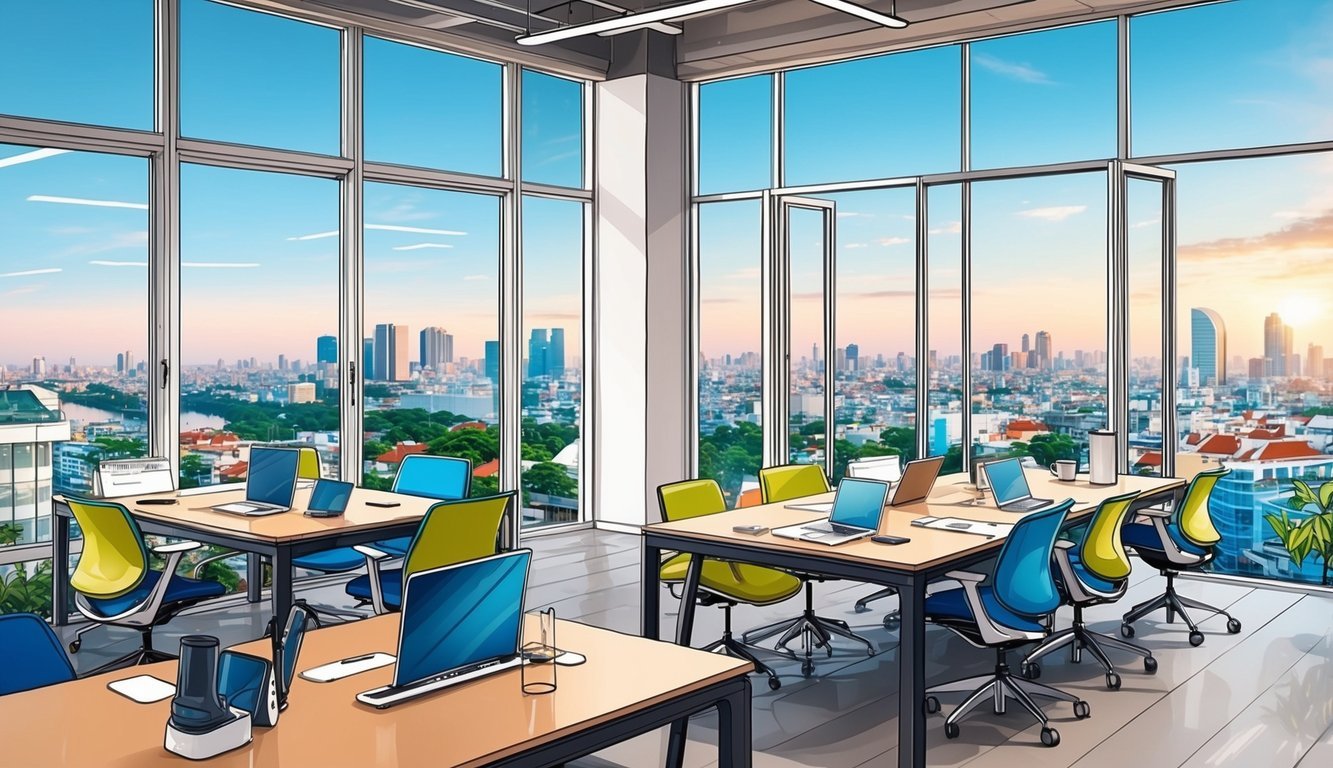
Living in Ho Chi Minh City comes with its own set of health and safety considerations.
Understanding the climate and healthcare options will enhance your experience as a digital nomad.
Navigating the Climate
Ho Chi Minh City has a tropical climate, which means it’s generally hot and humid year-round.
You can expect high temperatures averaging 90°F (32°C) and humidity levels around 75-85%.
There are two main seasons: the dry season runs from December to April, and the rainy season lasts from May to November.
During the rainy season, sudden downpours are common, so always carry a lightweight rain jacket or umbrella.
Be mindful of air pollution, especially during the dry season.
It’s good to check air quality indexes and limit outdoor activities on heavily polluted days.
Healthcare and Insurance Tips
Access to healthcare is essential.
Ho Chi Minh City has numerous hospitals and clinics, both public and private, with private facilities usually offering better services.
It’s wise to get international health insurance that covers medical emergencies and routine care.
Some recommended hospitals include FV Hospital and Vinmec International Hospital, known for their quality care.
In case of emergencies, know local emergency numbers: Police (110), Ambulance (112), and Firefighter (113).
Carry a list of nearby hospitals and your insurance details for quick access.
Taking these steps will help ensure your health and safety while you explore this vibrant city.
Legal and Administrative
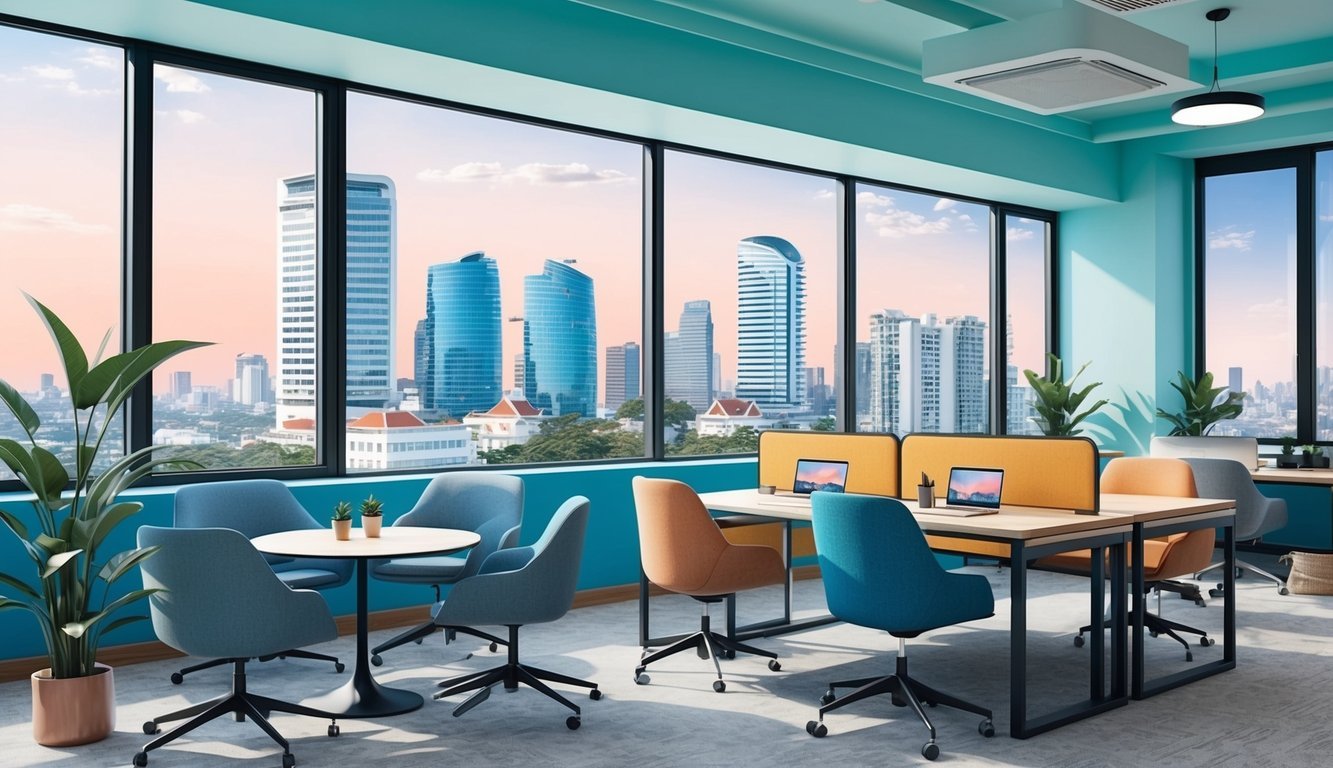
When living in Ho Chi Minh City as a digital nomad, understanding the legal and administrative aspects is crucial.
You’ll need to get clear on visas and work permits to keep everything smooth and hassle-free.
Navigating Visas and Work Permits
To kick things off, you’ll need the right visa.
Vietnam offers various visa options, including the tourist visa, which is perfect for short stays.
If you plan to work, you’ll need a work permit.
This often requires your employer to provide specific documents.
For freelancers, the digital nomad visa might not be officially available yet, but many opt for the tourist visa and leave the country periodically to renew it.
Make sure to check the latest regulations, as they can change.
Visa Requirements:
- Tourist Visa: Up to 30 days, can be renewed.
- Work Permit: Generally requires a local sponsor.
- Business Visa: If you’re meeting clients or partners.
Understanding Local Regulations
Ho Chi Minh City has its own local regulations that can affect your stay.
Street vendors and local businesses often have licenses, and it’s good to respect those rules.
Language exchange events can also be a great way to learn Vietnamese and navigate the local scene.
While many people speak English, learning a few basic phrases in Vietnamese can make your life easier and more enjoyable.
Staying informed about local laws, especially around housing and work conditions, will help you avoid any legal troubles.
Việt Nam has strict rules, so it’s better to be safe than sorry!
Frequently Asked Questions
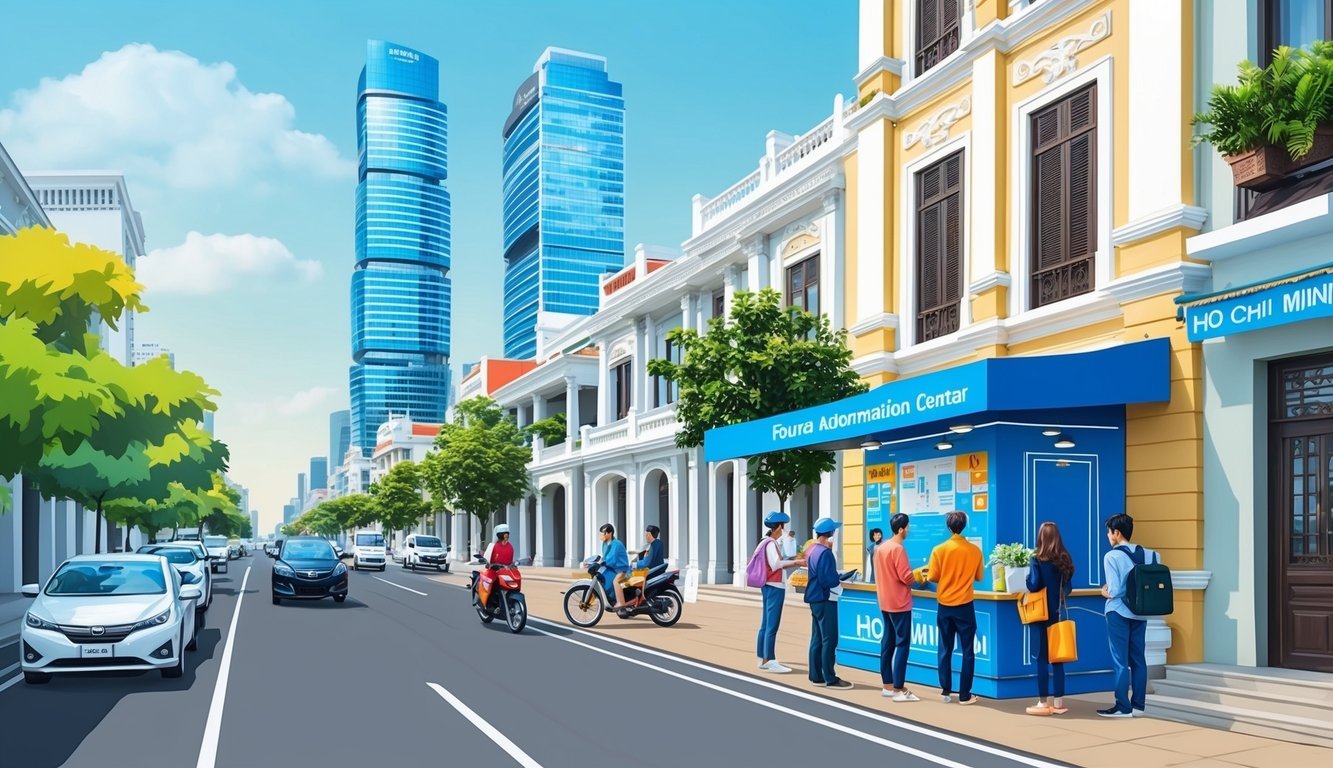
You might have a lot of questions about living and working as a digital nomad in Ho Chi Minh City.
It’s important to know what to expect regarding visas, coworking spaces, and the cost of living.
What are the visa requirements for digital nomads in Vietnam?
To work in Vietnam, you’ll generally need a work visa or a business visa.
Tourist visas allow some flexibility, but working without the proper visa can lead to problems.
Be sure to check the latest rules as they can change often.
Where can I find the best coworking spaces in Ho Chi Minh City?
There are many great coworking spaces scattered throughout the city.
Some popular ones include WeWork, Dreamplex, and CO189.
These places not only provide a desk but also a vibrant community of fellow digital nomads.
How do digital nomads handle taxation in Vietnam?
Taxation can be a bit tricky for digital nomads.
If you spend more than 183 days in Vietnam, you may be considered a tax resident and have to pay local taxes.
It’s wise to consult a tax professional who knows the local laws.
What’s the cost of living for digital nomads in Ho Chi Minh City?
Living in Ho Chi Minh City can be quite affordable.
On average, you might spend around $850 per month, which includes rent, food, and other expenses.
If you’re with family, that amount could rise to about $2,500.
Are there any particular legal considerations for digital nomads in Vietnam?
As a digital nomad, it’s important to follow local laws.
Make sure your visa is up to date and that you’re aware of any restrictions on your work.
Engaging with local communities can help you stay informed.
Which areas in Ho Chi Minh City are most popular among digital nomads?
Digital nomads love District 1.
It’s the business hub and offers plenty of cafes, coworking spaces, and restaurants.
Other popular districts include District 2 and District 3 for a more relaxed vibe while still being close to the action.

